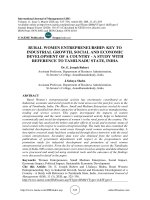Economic growth and economic development 259
Bạn đang xem bản rút gọn của tài liệu. Xem và tải ngay bản đầy đủ của tài liệu tại đây (158.54 KB, 1 trang )
Introduction to Modern Economic Growth
price of the consumption good in each date will be normalized to 1 and the interest
rates will directly give the intertemporal relative prices. This is the justification
for focusing on interest rates as the key relative prices in macroeconomic (economic
growth) models.
5.8. Optimal Growth in Discrete Time
Motivated by the discussion in the previous section let us start with an economy
characterized by an aggregate production function, and a representative household.
The optimal growth problem in discrete time with no uncertainty, no population
growth and no technological progress can be written as follows:
(5.18)
max ∞
{c(t),k(t)}t=0
∞
X
β t u (c (t))
t=0
subject to
(5.19)
k (t + 1) = f (k (t)) + (1 − δ) k (t) − c (t) ,
k (t) ≥ 0 and given k (0) > 0. The objective function is familiar and represents
the discounted sum of the utility of the representative household. The constraint
(5.19) is also straightforward to understand; total output per capita produced with
capital-labor ratio k (t), f (k (t)), together with a fraction 1 − δ of the capital that
is undepreciated make up the total resources of the economy at date t. Out of this
resources c (t) is spent as consumption per capita c (t) and the rest becomes next
period’s capital-labor ratio, k (t + 1).
The optimal growth problem imposes that the social planner chooses an entire
sequence of consumption levels and capital stocks, only subject to the resource
constraint, (5.19). There are no additional equilibrium constraints.
We have also specified that the initial level of capital stock is k (0), but this gives
a single initial condition. We will see later that, in contrast to the basic Solow model,
the solution to this problem will correspond to two, not one, differential equations.
We will therefore need another boundary condition, but this will not take the form
of an initial condition. Instead, this additional boundary condition will come from
the optimality of a dynamic plan in the form of a transversality condition.
245









